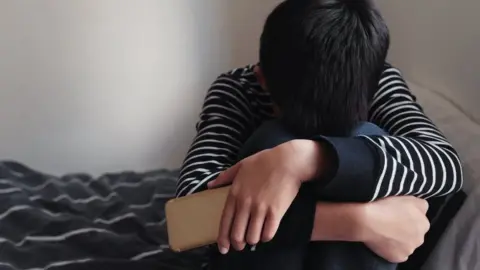Children in care 'failed' while some providers 'make millions'
 Getty Images
Getty ImagesThe most vulnerable children are being "failed by the state" and a broken residential care system, the children's commissioner for England has said.
Greater use of private provision has led to a fragmented, unco-ordinated and irrational system amid "significant profits", said Anne Longfield.
The system has been allowed to slip deeper into crisis, she said.
The government said an independent review of children's social care would begin "as soon as possible".
Ms Longfield has published three reports detailing the plight of children the system "doesn't know what to do with".
She said the government has failed to respond to previous warnings that thousands of these children are in danger of becoming victims of criminal and sexual exploitation.
Older children were found to be living in "disgusting" conditions akin to a prison cell, one of the reports said.
It described how one 17-year-old said her accommodation was filthy and smelly, with just one working shower - covered in mould - between 14 children and young adults.
"Elsewhere children have told us they have not even been provided with the means to eat or sleep - things like duvet covers, plates or cutlery," the same report said.
All three reports highlight a shortage of children's home places, resulting in:
- 8,000 children moving between three or more homes within a year
- 13,000 children in unregulated homes at some point during a year
- hundreds unable to get places in a secure children's homes
"Only last month, a High Court judge wrote to me after an extremely vulnerable child in care could not get a suitable care home place anywhere in the country, even though the courts had found their life was in danger," said Ms Longfield.
"These shocking cases used to be rare but are now routine, and I am worried the whole system is becoming immune to the devastating effect this is having on children who may have previously been abused and neglected, or have serious mental or physical health needs."
Profit and debt
One of the reports analyses how, over the past decade, as demand for care has grown and local authority provision has failed to keep pace, private provision has expanded.
The researchers found the majority of private provision was rated good or outstanding by Ofsted, although smaller providers were more likely to have lower ratings than either larger providers or local authorities.
Some providers are owned by private equity companies and carry "significant amounts of debt" which could "risk their stability", says the report.
"Both the government and councils have failed in their responsibilities by leaving it to the market," said Ms Longfield.
"The growing reliance on private providers, some of whom are making millions, is another symptom of a system failing to prioritise the needs of children."
Iryna Pona, policy manager at the Children's Society, said the reports were enormously worrying but not surprising.
"The Children's Society is very concerned about how children in care are being failed by the very services who are supposed to be caring for and protecting them," she said.
The Local Government Association, which represents councils across England, says it shares the commissioner's concerns about the risk of businesses running children's homes going bust as adult care provider Southern Cross did, almost a decade ago.
"Providers should also not be making excessive profit from providing placements for children," said Judith Blake, who chairs the LGA's Children and Young People Board.
A Department for Education statement said: "The education secretary has been clear that no child should be denied the opportunity for a loving, stable family life, or be bounced around the care system in accommodation that does not meet their needs.
"We have also set out that children under the age of 16 should not be living in unregulated homes.
"Our bold, broad and independently led care review will launch as soon as possible, and will support improvements in the children's social care system."
